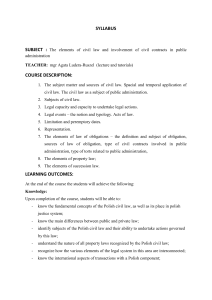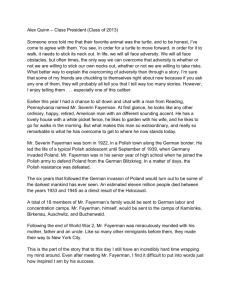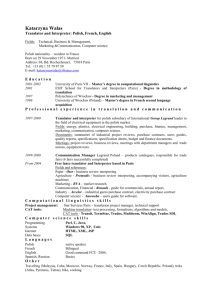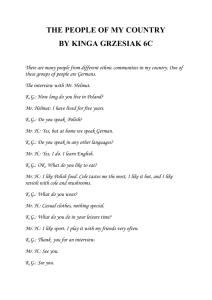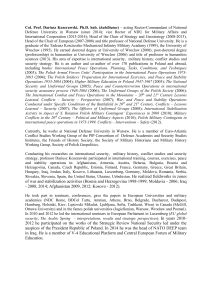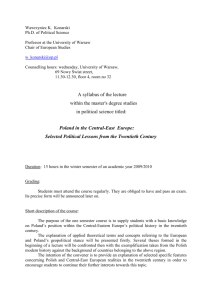Full article
advertisement
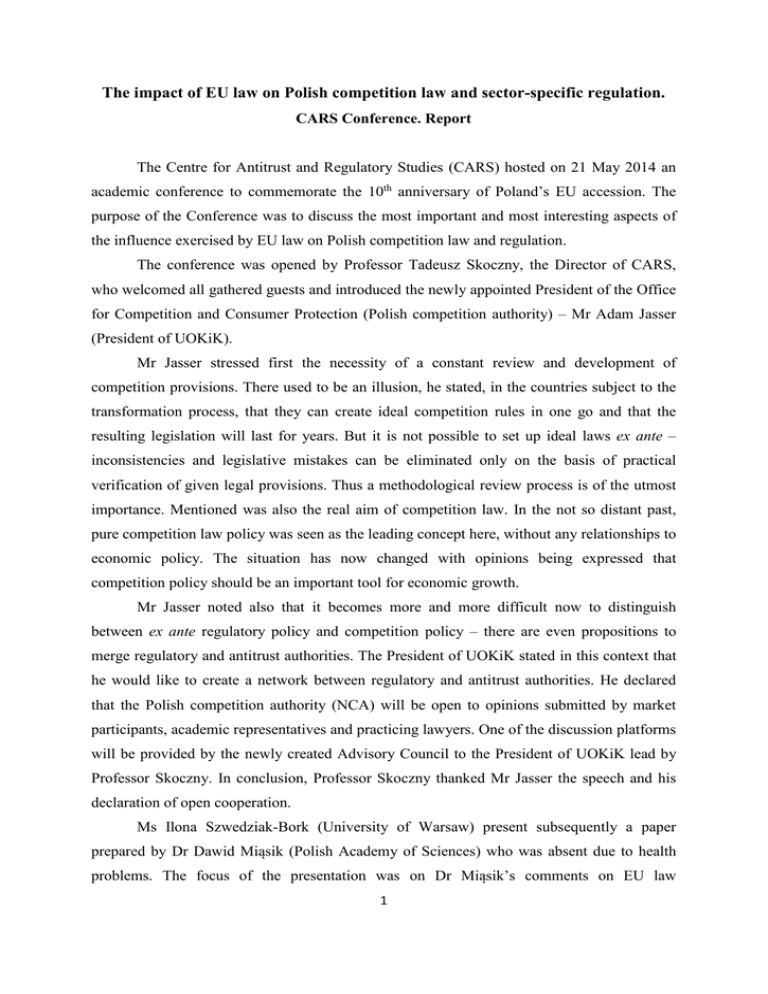
The impact of EU law on Polish competition law and sector-specific regulation. CARS Conference. Report The Centre for Antitrust and Regulatory Studies (CARS) hosted on 21 May 2014 an academic conference to commemorate the 10th anniversary of Poland’s EU accession. The purpose of the Conference was to discuss the most important and most interesting aspects of the influence exercised by EU law on Polish competition law and regulation. The conference was opened by Professor Tadeusz Skoczny, the Director of CARS, who welcomed all gathered guests and introduced the newly appointed President of the Office for Competition and Consumer Protection (Polish competition authority) – Mr Adam Jasser (President of UOKiK). Mr Jasser stressed first the necessity of a constant review and development of competition provisions. There used to be an illusion, he stated, in the countries subject to the transformation process, that they can create ideal competition rules in one go and that the resulting legislation will last for years. But it is not possible to set up ideal laws ex ante – inconsistencies and legislative mistakes can be eliminated only on the basis of practical verification of given legal provisions. Thus a methodological review process is of the utmost importance. Mentioned was also the real aim of competition law. In the not so distant past, pure competition law policy was seen as the leading concept here, without any relationships to economic policy. The situation has now changed with opinions being expressed that competition policy should be an important tool for economic growth. Mr Jasser noted also that it becomes more and more difficult now to distinguish between ex ante regulatory policy and competition policy – there are even propositions to merge regulatory and antitrust authorities. The President of UOKiK stated in this context that he would like to create a network between regulatory and antitrust authorities. He declared that the Polish competition authority (NCA) will be open to opinions submitted by market participants, academic representatives and practicing lawyers. One of the discussion platforms will be provided by the newly created Advisory Council to the President of UOKiK lead by Professor Skoczny. In conclusion, Professor Skoczny thanked Mr Jasser the speech and his declaration of open cooperation. Ms Ilona Szwedziak-Bork (University of Warsaw) present subsequently a paper prepared by Dr Dawid Miąsik (Polish Academy of Sciences) who was absent due to health problems. The focus of the presentation was on Dr Miąsik’s comments on EU law 1 harmonization and the main tools used in this regard. In his opinion, harmonisation may be analyzed both on the basis of directly binding and not directly binding legal provisions. The former is represented by regulation while the latter comprises mainly directives, international agreements and soft law. According to Dr Miąsik, there are four main tools of harmonisation used in Poland. The first are prejudicial questions submitted to the CJEU, even though Polish courts have so far rarely used this tool. However, lack of prejudicial questions does not mean that EU law is not taken into account in Polish jurisprudence – national judges are well aware of EU law, as shown by the content of many judgments. Two examples of Polish rulings containing very important indications on how to apply EU law in Poland were given in the presentation. They included Supreme Court judgment no III SK 16/09 where it was explained that EU soft law has no binding character in Poland. CJEU judgments resulting from actions brought by the European Commission against Member States were said to be another important harmonization factor here. Pro-EU interpretation of national laws was identified as the second harmonization tool. Such interpretation has a great influence on the understanding of national law; it may influence the literal or functional interpretation of local laws. Although all state bodies applying the law must employ pro-EU interpretation, it must be verified first whether a given case has an EU aspects. Pro-EU interpretation causes national courts to change national interpretation, which may lead to the imposition on a given entity of obligations which do not derive from national law. Polish courts have a wide interpretational independence as regards EU law since there is no reason for assuming that any aspect of EU law that might arise in an individual case has previously been clarified by a prejudicial question. According to Dr Miąsik, direct effect of EU law is the third tool of harmonization. National authorities are obliged to apply directly binding provisions of EU law. Direct effect of EU law guarantees individuals certain rights which may be executed in Member States. In competition law and State aid cases, the effects of EU law may be both in favor and against individuals. In cases regarding collective consumer rights, the effects of EU law may be only in favor of individuals. Direct use of EU law is controversial in cases of dispute, that is, against a counterparty of the proceedings. The fourth harmonization tool identified by Dr Miąsik was the EU law supremacy rule and the possibility of disapplying national law. As a result, a judgment may be issued based on EU provisions replacing national legislation. A judgment may also be issued based on 2 different rules of national law being in line with EU law. Finally, a judgment may be issued on the basis of joint application of national and EU law. When comparing the above mentioned four harmonization tools, it may be said that prejudicial questions had very little influence on the application of EU competition law in Poland. Pro-EU interpretation of national laws proved the most popular tool while disapplication of national rules incompatible with EU law is very rare. Professor Sławomir Dudzik (Jagiellonian University) chaired the first session of the conference entitled ‘Harmonisation of Polish competition law with the common rules of EU law’. Professor Krystyna Kowalik-Bańczyk (Polish Academy of Sciences) spoke of the ways of harmonizing Polish law with that of the EU. She explained first that, in the area of competition law, we should not talk about harmonization, but mainly about the unification of law because EU law is applied instead of, or aside from, national law where a given case has an EU character. The main tool of such unification is found in the legal provisions directly applicable in Member States. By contrast, harmonisation is an adjustment of national legal solutions to EU rules, mainly in regulatory matters such as telecoms regulation. The main tool of harmonization is found in directives, not directly applicable in Member States, but merely giving directions for the changes to follow in national legislations. Before Poland’s accession to the European Union, the Accession Treaty contained a formal harmonization duty. No such formal obligation currently exists. Professor Kowalik-Bańczyk listed three types of harmonization: spontaneous harmonization, harmonization based on jurisprudence, and direct harmonization via directives. Spontaneous harmonization is a natural process of voluntary duplication of EU provisions in national legislation. It concerns mainly procedural issues, like leniency applications. Harmonisation based on jurisprudence is realized via prejudicial questions. Answers to such questions given by the European judiciary contain suggestions for the Member States regarding amendments needed in their legislation. Direct harmonization via directives in competition law is controversial seeing as the Treaty gives grounds for unification, but not for the harmonisation process in this field. Yet the first example of a directive covering competition issues exists now in the Directive on antitrust damages actions (adopted by the Parliament on 17 April 2014 and provisionally agreed between the Parliament and the Council). It may be applicable both to situations with, and without an EU element. 3 Mr Piotr Sitarek (Jagiellonian University) spoke of the ‘Influence of EU law on the shape of the Polish leniency programme’. He noted that there is procedural autonomy of national authorities applying leniency programmes since a unified EU leniency procedure does not exist. Yet this autonomy is limited by the rules of equivalence and efficiency. National jurisprudence, for instance from Germany and Great Britain, shows that national courts respect these rules and limit disclosure of documents provided during leniency procedures for the purpose of private enforcement proceedings. There is no Polish jurisprudence in leniency cases. The Polish Competition Act gives a high standard of protection to leniency documents and information gathered during leniency proceedings. This standard is even higher in the newest amendment act (the Polish Parliament has finished working on it on 10 June 2014). Limitations of national leniency programmes derive from EU law. For instance, the Europeans judiciary explained that leniency programmes must be indispensable for the purpose of competition law protection and national organs may grant immunity in exceptional situations only. In this context, the Polish leniency programme is too wide as it is used also to vertical agreements which do not cause major problems with gathering evidence and their negative impact on competition is not so great as to justify the use of leniency. The following presentation by Mr Marcin Kulesza (University of Social Sciences and Humanities) was entitled ‘Leniency – the Polish leniency programme and ‘half-formal’ harmonisation in the EU via the European Competition Network’. It was noted first that the Polish leniency programme was introduced in 2004 and reflected the rules of the European Commission’s leniency programme introduced on 13 February 2002. Both programmes are based on the same principle – immunity from fines or fine reductions in exchange for a given behavior of entrepreneurs. The key difference between both regimes concerns the approach to the reduced fines – the Polish leniency programme, unlike the European Commission’s one, is applicable to all agreements, not only cartels. The development of the leniency programme in the European Union is connected with the activities of the European Competition Network (ECN). Apart from Article 11 of Regulation 1/2003, all other bases of its activities have an informal character and are not binding documents. The ECN is not controlled by any formal body, nor is it controlled by the courts. The main goals of the ECN are: uniform and effective application of EU competition law, increased participation of national authorities in the application of EU competition law, coordination of the activities of NCAs, supporting a joint European competition culture. The 4 ECN is not an organization, nor an authority or legal person – it is only a forum of cooperation between the European Commission and the NCAs. Informal harmonization of leniency programmes takes thus place via documents of a political character issued by the ECN, being a half-formal body. These documents are meant to develop the most important procedural and material provisions being the basis of harmonization of the leniency programmes in various legal environments. The European Commission expressed its views on leniency in the Model Leniency Program of the ECN (MLP) dated 2006 and revised in 2012. The MLP, and the communication from the European Commission, repeatedly stress the obligation of the members of the ECN (that is, NCAs) to adjust their leniency programmes to the MLP. Current Polish competition law does not fully reflect the MLP requirements. However, the revised MLP was taken into account when preparing the amendment of the Polish Competition Act (the Polish Parliament has finished working on it on 10 June 2014). The latter envisages the possibility of obtaining immunity by the instigator of the illegal agreement as well as the possibility to postpone withdrawing from participation in the illegal practice. Still, there are important issues not included in the amendment such as the obligation to justify a simplified leniency application by the applicant and permitting other applicants requesting only a fine reduction to submit a simplified leniency application. During the discussion that followed, Dr Dominik Wolski (in-house lawyer, Jeronimo Martins) asked Professor Kowalik-Bańczyk whether the Directive on antitrust damages actions may really be given as an example of the harmonization of competition law, rather than the harmonization of civil law and civil procedure. Professor Kowalik-Bańczyk answered that the Directive is, in fact, not an example of classic harmonization of competition law because it covers changes in civil law and civil procedure provisions as well as some competition law provisions. Therefore, the whole Directive was given as an example of harmonization of competition law. Ms Małgorzata Modzelewska-de Raad (Modzelewska & Paśnik law firm) posed a question to Professor Kowalik-Bańczyk whether it is necessary to harmonize national material competition law. Professor Kowalik-Bańczyk answered that probably not, because national laws may have different aims. Full harmonization is thus not necessary, different national material competition rules are needed. Mr Maciej Fornalczyk (Comper Fornalczyk and Partners) made a comment that good harmonization depends not only on good legal provisions, but also on the way they are 5 applied in practice by the NCAs. Entrepreneurs claim that the European Commission is more open and ready for cooperation and so they often consider submitting a case to the Commission rather than to the NCAs. Referring to the harmonization issue, Ms Elżbieta Modzelewska-Wąchal (Competition Law Center, law firm of legal advisor Elżbieta Modzelewska-Wąchal) stated that the aim of national competition law is to protect competition on the domestic market, whereas EU rules are applicable only to situations where a given practice can influence the European market. Therefore, as long as national competition law is created, it is a political issue what standard of protection will be applied on a domestic market. With respect to Polish leniency, Ms Elżbieta Modzelewska-Wąchal claimed that it is not effective because it is based on severe fines. The fines are calculated based on total incomes rather than on incomes connected with the products or services covered by the illegal agreements. In his closing remarks, Professor Dudzik stressed that harmonization may by understood narrowly – based on legal acts – or widely – as soft harmonization, based on jurisprudence. Harmonisation does not only occur via directives, but also via regulations. Some behavioral rules for NCAs are included in Regulation 1/2003. Some are also found in the Merger Regulation 139/2004, which states that NCAs may apply national law only to concentrations without an EU dimension. Professor Dudzik noted that the aim of harmonization is also interesting – whether it is only the approximation of legal provisions, or whether it is also meant to influence economic growth. The second panel of the conference was entitled ‘Selected problems in the application of competition law’. It was moderated by Professor Cezary Kosikowski (Univeristy of Białystok). Mr Maciej Gac (Jagiellonian University, Toulouse University) gave the first presentation entitled ‘Protection of individuals from competition law violations – development of private enforcement in Polish and European competition law’. The development of the private enforcement doctrine in the EU was presented first. Two paths were emphasized: European jurisprudence and the legislative activity of the European Commission. With reference to the former, attention was given to the Courage, Manfredi, Pfleiderer and Donau Chemie judgments. The role of the European judiciary was specifically highlighted for the importance of the private enforcement doctrine. Outlining the impact of the Commission’s legislative activity on private enforcement, Mr Maciej Gac stressed a 6 number of soft law instruments and public consultations. He also noted the legislative work on the Directive on certain rules governing actions for damages under national law for infringements of the competition law provisions of the Member States and of the European Union. Considering the development of private enforcement in Poland, Mr Maciej Gac has divided the subject into activity of the NCA, the jurisprudence of national courts (especially of the Supreme Court) and legislative changes. Considered in conclusion was the lack of efficiency in the observed doctrinal development. According to the presented statistics, merely 56 proceedings concerning private claims were conducted in a total of only 7, out of the 28, EU Member States between 2006-2012. Dr Agata Jurkowska-Gomułka (University of Warsaw) commented on the above conclusions in light of the practice and experiences of claims’ execution. Mr Piotr Sitarek (Jagiellonian University) provided his thoughts on the democratization of private enforcement. Dr Dominik Wolski (in-house lawyer, Jeronimo Martins) presented a speech entitled ‘Private enforcement – Polish perspective on the activities conducted by the European Commission’. In his commentary, Dr Dominik Wolski tried to answer why consumers (and entrepreneurs) are not keen on executing their claims in courts. Among many of the possible reasons, he specifically highlighted: burden of proof, necessity of bearing procedural costs vs. uncertainty of the result, time frame of the proceedings and short limitation period. The majority of the presentation was devoted to difficulties in terms of proper claim calculation seen as another possible explanation. Dr Agata Jurkowska-Gomułka agreed with Dr Dominik Wolski’s arguments concerning difficulties in proper claim calculation stating, however, that it shouldn’t be an obstacle for the use of private enforcement. Mr Jacek Krzemiński (Nicolaus Copernicus University) spoke of EU law’s influence on the execution of Polish competition law by arbitral tribunals, highlighting the importance of arbitrage in competition law. He stated that neither the provisions of Regulation 1/2003, nor Polish competition law or the Directive take into account arbitral tribunals, whereas the possibility of executing competition law by arbitrators already exists. Mr Jacek Krzemiński stressed the existence of arbitration for competition law proceedings. He also highlighted existing doubts concerning execution. Two important judgments were pointed out: US Supreme Court judgment Mitsubishi Corp vs. Soler Chrysler-Plymouth and CJEU’s judgment Eco Swiss China Time Ltd. vs. Benetton International NV. Mr Jacek Krzemiński highlighted 7 their results including the obligation for the arbiters to apply the provisions of competition rules. As a part of the discussion, Mr Robert Gago (solicitor, Hogan Lovells) raised the issue of the possibility of using arbitrage to agreements limiting competition, abuse of a dominant position as well as excluding certain cases from arbitrage. Mr Szymon Syp (PhD. candidate, Warsaw School of Economics) noted the problem of executing arbitrage in different legal orders. The following presentation concerned the statutory ban on advertising in the light of EU competition law. The analysis provided by Professor Sławomir Dudzik and Ms Ewelina Rumak (Jagiellonian University) was based on two questions: should the bans on advertising be judged on the basis of Article 101 TFEU and should statutory bans be judged on the above stated article. Answering the first question, it was stated that the ban on advertising should be treated as a competition limitation in light of Article 101 TFEU. Referring to the second issue, authors showed that the statutory bans on advertising applied by Member States could be also treated in the context of Article 101 TFEU when we analyze the statutory bans on advertising from the perspective of the state action doctrine (according to which Articles 101 and 102 TFEU although addressed to entrepreneurs, could be also used by the authorities of the Member States) and CJEU’s judgment van Eycke vs ASPA NV (van Eycke formula). To sum up, authors indicated the admissibility of statutory bans on advertising in the light of Article 101 TFEU and the possibility of the justification of statutory bans with the principle of proportionality. As part of the discussion, Mr Piotr Semeniuk shared his thoughts on the ruling criteria for the statutory ban on advertising. Dr Małgorzata Kozak (solicitor) reflected on private enforcement, noting in this context Polish legislation on unfair market practices, which is currently not used in practice. The next session was entitled ‘Surrounding the issues of an economic approach to competition law, merger control and sectorial regulation’. It was divided into two separate parts. Ms Anna Laszczyk (University of Łódź) claimed first that an economic approach in applying competition law is present in the case law of the President of UOKiK only to a limited extent. The researcher presented an effect-based approach of the Polish competition authority in three areas: (i) consumer welfare and efficiency, (ii) individual exemptions and (iii) objective justification. She pointed out that one may observe an evolution of the 8 application of consumer welfare, from regarding consumer interests from an institutional perspective to the cornerstone of Polish competition policy. However, ordoliberal elements are still visible as the protection of competitors is still occasionally referred to. She also noted that the Polish competition authority does not, in principle, consider dynamic efficiency during its decision-making. With regard to individual exemptions, the NCA applies a formalistic approach based on a high-standard of empirical evidence, a fact that directly leads to its rare use. Moreover, the President of UOKiK seldom seeks an objective justification of an undertaking’s market behaviour and generally limits that justification to external, objective circumstances. Hence, the efficiency defence is almost nonexistent in the Polish competition law practice. The researcher stated that although the Polish competition authority refers to economic concepts in its case law, the latter is rarely based on the NCA’s own economic analyses. As a result, Ms Laszczyk postulated for the use of ‘more economic approach’ in Polish competition policy but for it be preceded by a discussion concerning economic policy, which would be its foundation. Mr Szymon Syp (Warsaw School of Economics) presented the behavioural approach to competition policy which according to him should supplement the traditional economic approach used by competition authorities. Outlined first were the principles of behavioural economics, which aims to verify whether individuals are acting rationally and in pursuit of maximising utility and explains economic theories by analysing psychological grounds of human behaviour. To support his claims, the researcher offered several examples showing the practical application of those tools to competition policy. They included opt-in and opt-out systems of class actions, duration of cartels and the screenings of markets on which cartels were concluded. Mr Dariusz Aziewicz (University of Warsaw) presented the approach taken by the President of UOKiK and the European Commission to non-coordinated effects in the evaluation process of horizontal mergers. It was first indicated that the significant impediment of effective competition (SIEC) test was introduced simultaneously into Polish and European competition laws in 2004 as a step into more economic approach. A decade of the application of the SIEC test makes it possible to make first assessments of the de facto approaches to horizontal mergers under both legal regimes. The researcher first focused on decisions of the President of UOKiK which, in his opinion, still show a structural approach to horizontal mergers (based on market shares, barriers of entry, potential competition etc.). However, Mr 9 Aziewicz noted the Empik/Merlin merger prohibition where the NCA attempted to evaluate the operation’s non-coordinated effects on the basis of market research. The speaker continued on to point out how economic evaluations are conducted by the European Commission. Starting with cases from the beginning of the century (thus evaluated under the old dominance test but after the Airtours judgment and GE/Honeywell decision) he indicated that besides the basic merger control elements (as given above), the European Commission performs a strict economic evaluation of competitive pressure exerted between the merging companies and evaluates how this pressure is directly influencing consumer welfare – mainly market prices. The researcher provided examples of mergers evaluated by the European Commission before the introduction of the SIEC test, as well as the TMobile/Telering and the latest Ryanair decisions. In his opinion, an evaluation of the pressure exerted between merging entities, by way of econometric tools, should be a necessary element of the control process of horizontal mergers. It gives a factual view on the influence of the planned merger on prices and other factors constituting consumer welfare. Mr Aziewicz postulated also that such evaluation has to be performed in the current merger control world even if very high market shares are arising due to the planned operation. Dr Ewa Kwiatkowska (Akademia Leona Koźmińskiego) presented the economic criteria used by the President of UOKiK and the President of UKE (Polish telecoms authority, NRA) in their decisions concerning the competitiveness of telecoms markets in Poland, especially with regard to market power. She indicated that between 2003 and 2013 the use of qualitative criteria by the President of UKE evolved and that the regulator no longer limits itself to a structural analysis. At the same time, the President of UOKiK was said to still consider only a smaller number of qualitative criteria. According to the researcher, the NCA remains heavily dependent on a structural analysis while qualitative criteria are used in a selective manner and, in principle, are not decisive for the final outcome. The first part of the panel was followed by a discussion on the application of an economic approach by the Polish competition authority. Professor Konrad Kohutek (Krakowska Akademia im. Andrzeja Frycza Modrzewskiego) considered the implications of the shift from the dominance test to the SIEC test whereby the latter covers a wider scope of cases. He postulated that the correct application of any test should be one of the priorities of competition authorities. The first part of the session was concluded by Professor Waldemar Hoff (Akademia Leona Koźmińskiego) who stressed the importance of the rule of law when using economic 10 analyses in competition law cases. He indicated that they are not free from influence of earlier case law or soft law documents published by competition authorities. As a result, Professor Hoff postulated for ‘procedural formalism’, which should ensure reliability and a high standard of the conducted economic analyses. The second part of this session covered the presentations by Mr Wojciech Podlasin, Mr Piotr Semeniuk, and Dr Mateusz Chołodecki. Mr Wojciech Podlasin (University of Warsaw) indicated that after Poland’s entry into the European Union in 2004, EU law exercised major influence on financial supervision in Poland due to four major reasons. The law concerning the financial sector is, in principle, created at the EU level in a so-called Lamfalussy process with the aim to create a single rulebook for the financial services industry. At level 1 of the process, framework legislation is adopted using maximum harmonisation directives or directly applicable regulations. At level 2, implementing rules are adopted mostly in the form of regulations. This leaves Member States with limited discretion to regulate financial services activities at a national level. Mr Podlasin also stated that as a result of the post-financial crisis reform, the Committee of Financial Supervision (Polish financial supervision authority) is more involved in the financial supervision system with the newly created EBA, ESMA and EIOPA aiming to, inter alia, develop a coordinated and converging supervisory approach within the EU. He also pointed out that EU law was an inspiration to create new macro-prudential supervision authorities in Poland. An Act establishing the Council of Systemic Risk is currently at the legislative stage. Mr Podlasin also claimed that the new Single Supervisory Mechanism, with the European Central Bank as a financial supervision authority for major banks of the eurozone, commencing its activity in November 2014, will have a significant impact on the modus operandi of the Polish Committee of Financial Supervision. Mr Piotr Semeniuk identified in his presentation the basic differences between the approach to the notification of joint ventures in Poland and in the European Union. He described the main aspects of the approach to joint ventures indicated by the European Commission in the Consolidated Jurisdictional Notice (the requirement of full functionality and joint control). He then continued on to describe the approach contained in Polish law indicating that the latter does not formulate the requirements of full functionality or joint control like its European counterpart. Such an approach of the Polish competition authority is stipulated in its Guidelines on the criteria and procedure of merger control notification. In his opinion, this kind of approach is inconsistent with European law and undermines the goals of 11 Polish competition law. In conclusion, he stated that there is no need to amend the Polish Competition Act to change the approach to JVs in Poland because a soft law amendment (the above mentioned guidelines) would be sufficient to reflect the direction of the European Commission. Dr Mateusz Chołodecki’s (Poznań University) speech concerned regulatory matters. The researcher focused on the cooperation between the European Commission and the President of UKE (NRA) precisely describing the legal character of the cooperation between the President of UKE and the European Commission. He indicated that the latter is often referred to as the so-called ‘super regulator’ and, on first glance, there is a significant scope of cooperation between NRAs and the European Commission as well as great influence exerted by the European Commission on NRAs. Next, the researcher described the scope of the cooperation, its phases and decisions taken within the scope of that cooperation. In his conclusions, Dr Chołodecki stressed that the President of UKE de facto always acts as the author of its regulatory decisions and yet the Court of Competition and Consumers Protection, which supervises those decisions, should be bound by the instructions of the Commission. Dr Chołodecki indicated that due to the pan-European scope of the business activities of telecoms enterprises, there is a need to appoint a pan-European regulatory body to cover electronic communications in the entire territory of the European Union. Professor Skoczny summarized the conference by noting the importance of the practice-based approach towards competition law legislation. The conference provided a unique opportunity to have both practitioners and academics thoroughly elaborate on competition law. Professor Skoczny invited all participants to the next conferences. Marcin Kolasiński Ilona Szwedziak-Bork Wojciech Podlasin Dariusz Aziewicz PhD Candidates, Faculty of Management, University of Warsaw 12

